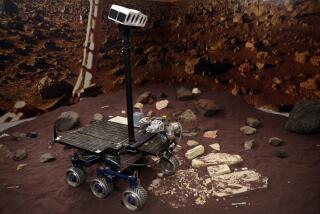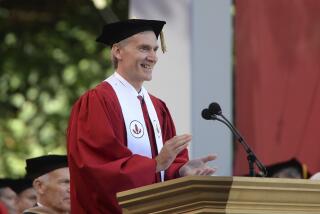Freeing the prisoners of NASA
- Share via
You could place Michael Eisen in the same league as Aaron Swartz.
Like the late Swartz, who campaigned for free public access to government publications and academic papers, UC Berkeley biologist Eisen is one of the genuine pioneers of open-access academic publishing. That’s the notion that scientific papers should be made available free to researchers and the community at large, rather than hidden behind the expensive paywalls of profitable scientific journals.
Last week Eisen took his battle to NASA, which submitted the first papers to come out of the Jet Propulsion Laboratory’s popular Mars Curiosity rover project to Science magazine, which charged the public as much as $20 a day to access them. This after taxpayers ponied up $2.5 billion to send the Curiosity to Mars. The outcome? Eisen won, and so does the public.
First, some background.
In 2005 Eisen and two partners started the Public Library of Science to upend that business model by providing a place where researchers could publish for free. The nonprofit PLoS now publishes seven very highly regarded journals.
The partners’ point was that academic publishing made huge profits for journal owners, which got papers for free and then charged universities hefty subscription fees to read them. As he told me when I interviewed him after the PLoS launch, “We were outraged at the system.”
Eisen’s efforts were instrumental in getting UC to change its publication policy. The new rule, announced in August, requires UC faculty to grant the university a non-exclusive license for free for publication in the university’s eScholarship archive. Only then can they assign copyright to a commercial publisher. The policy isn’t perfect, as Eisen observed: UC faculty can opt out of free publication if they wish. But it’s a good start.
So when NASA turned over the first five Curiosity papers to Science, an outraged Eisen took matters into his own hands. He published all five on his own blog. “I am setting them free,” he wrote, observing that public fascination with Curiosity had been a huge boon to NASA and its prospects for more public funding. “I find it completely unfathomable that they would forgo this opportunity to connect the public directly to their science,” he wrote. “Shame on NASA.”
He explained that under the law, works of the federal government can’t be copyrighted.
And he got action. A few days after Eisen published, JPL sprung the papers (now numbering six) from their paywall prison. The papers are now all available for free public perusal at the JPL website. If you’re as fascinated as I am by planetary science, dig in, and tip your hat to Michael Eisen along the way. Someday all academic papers like this may be free.







